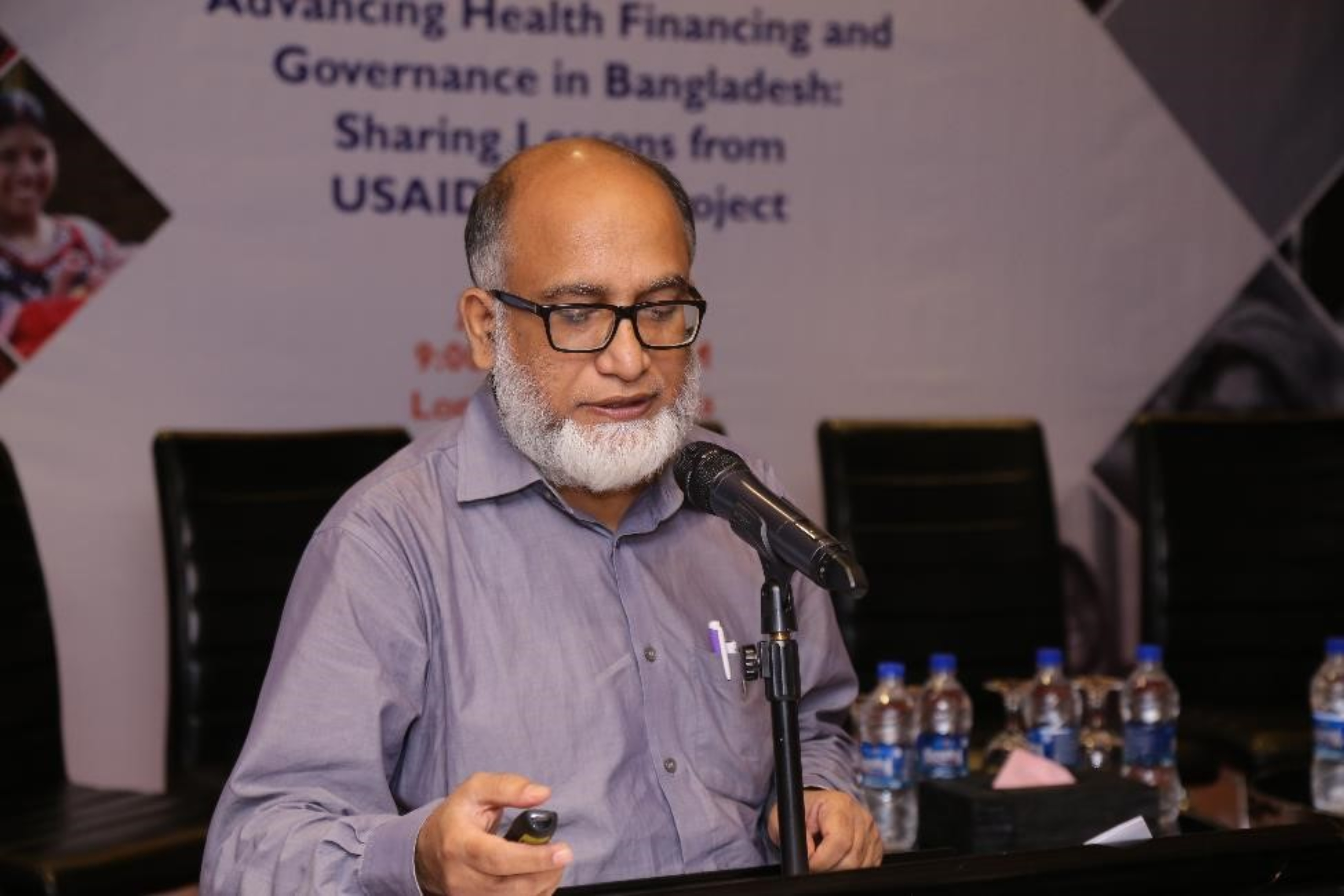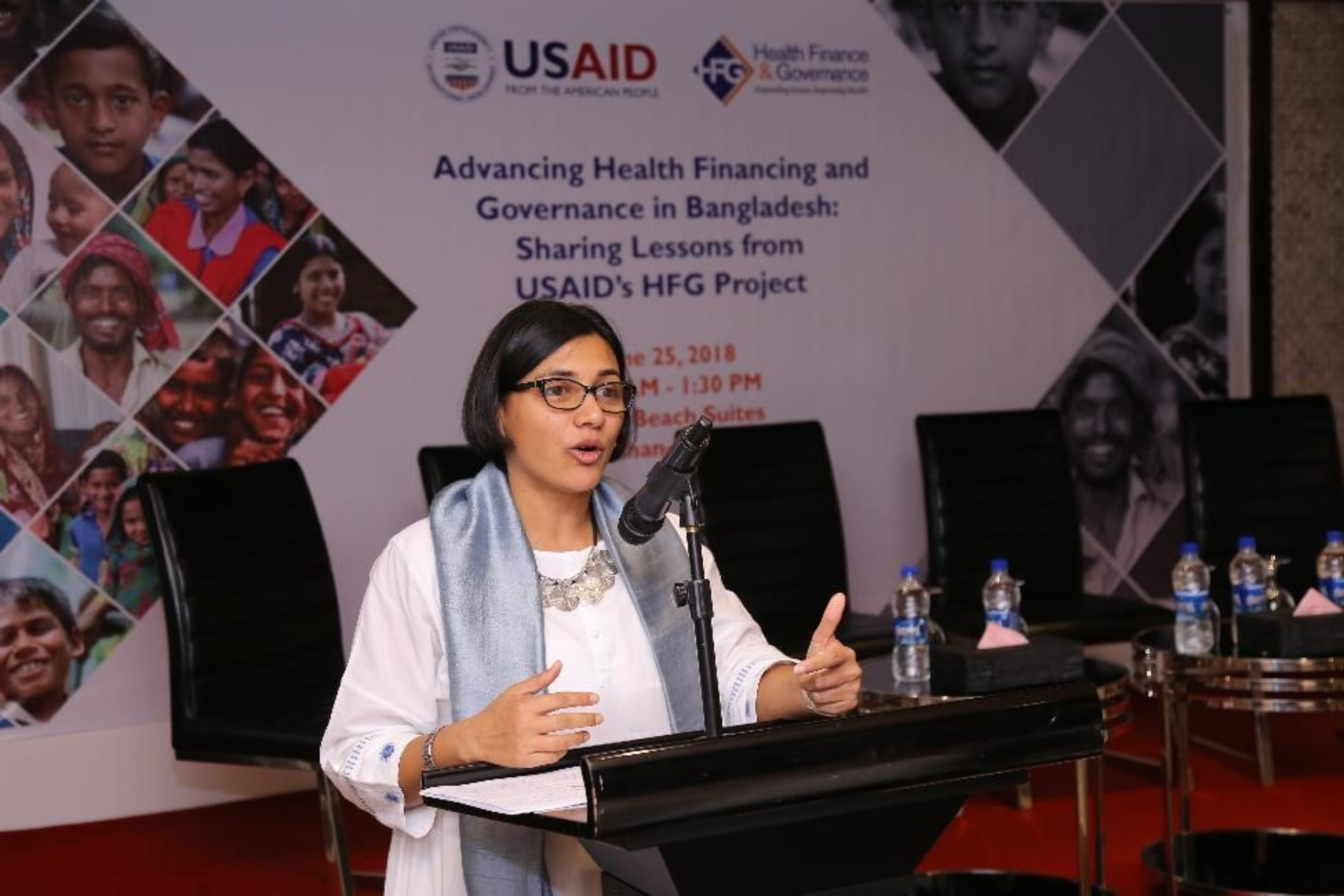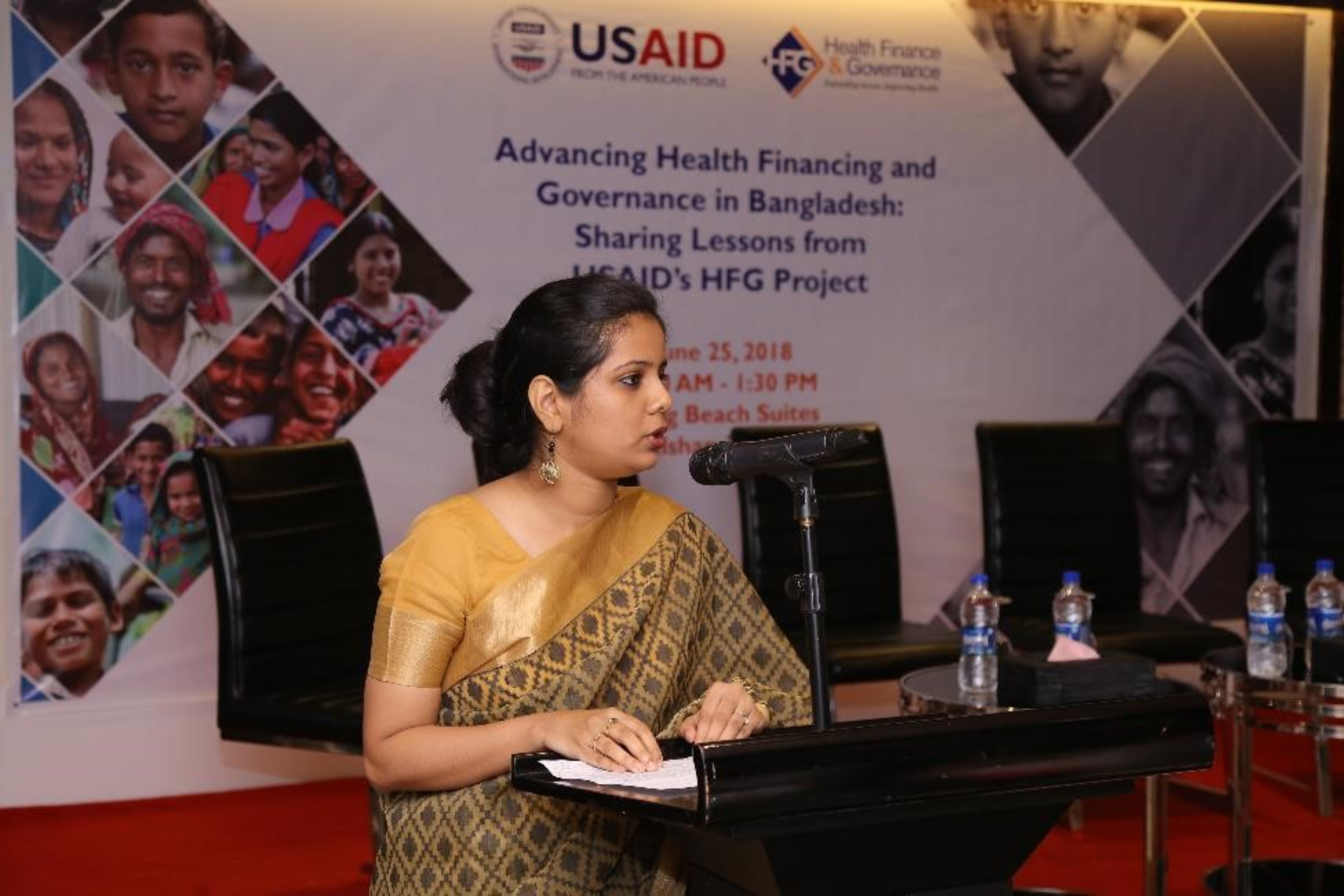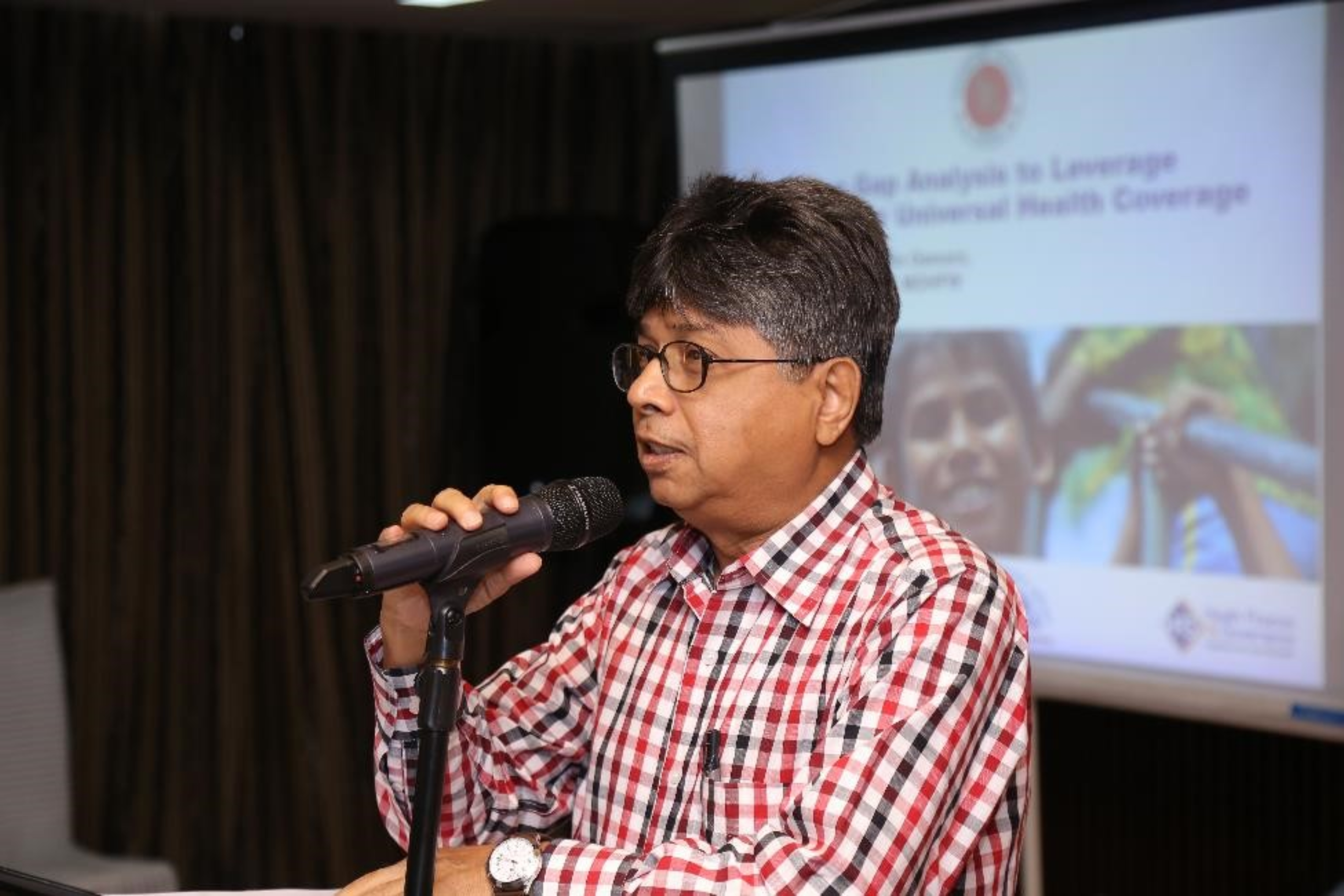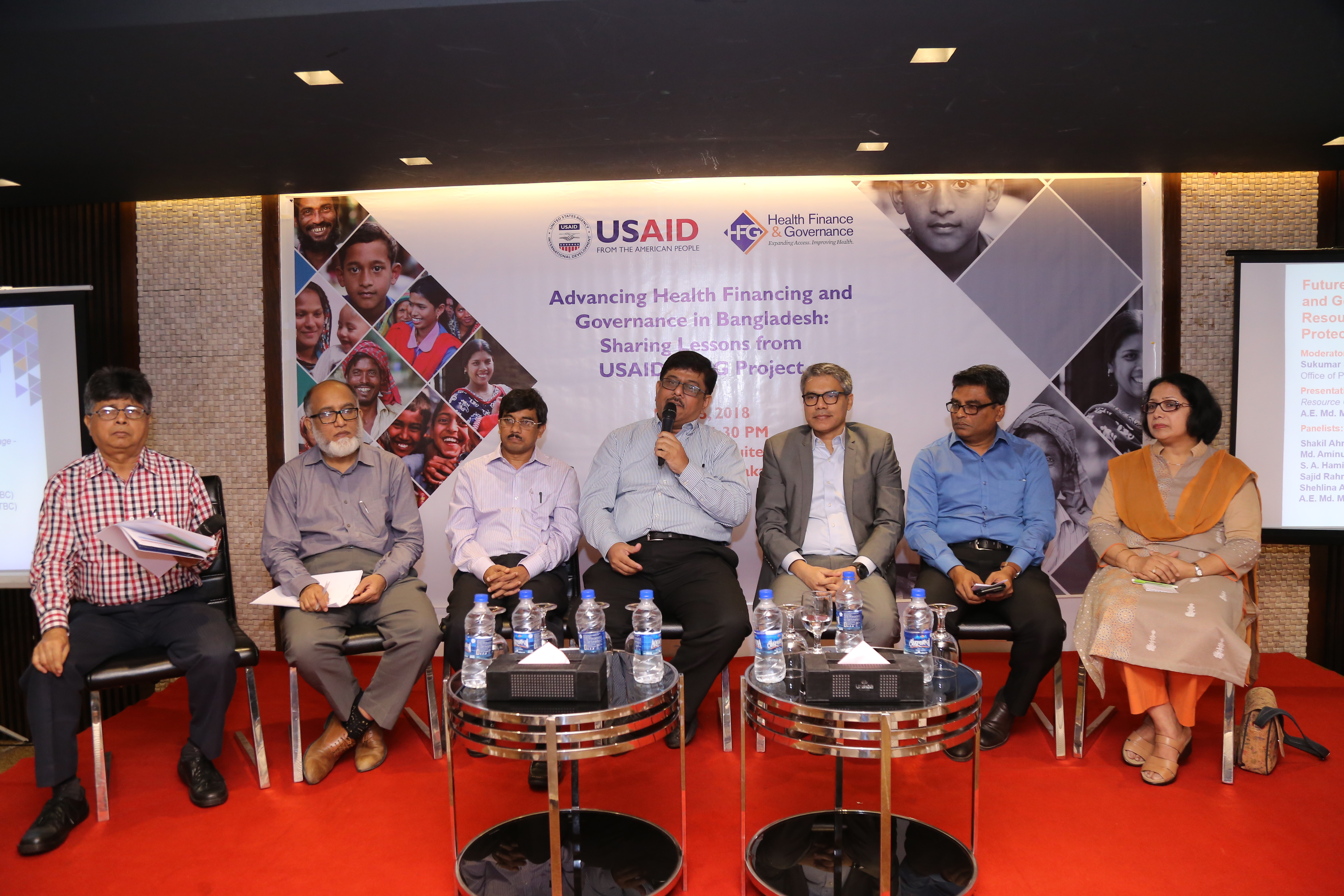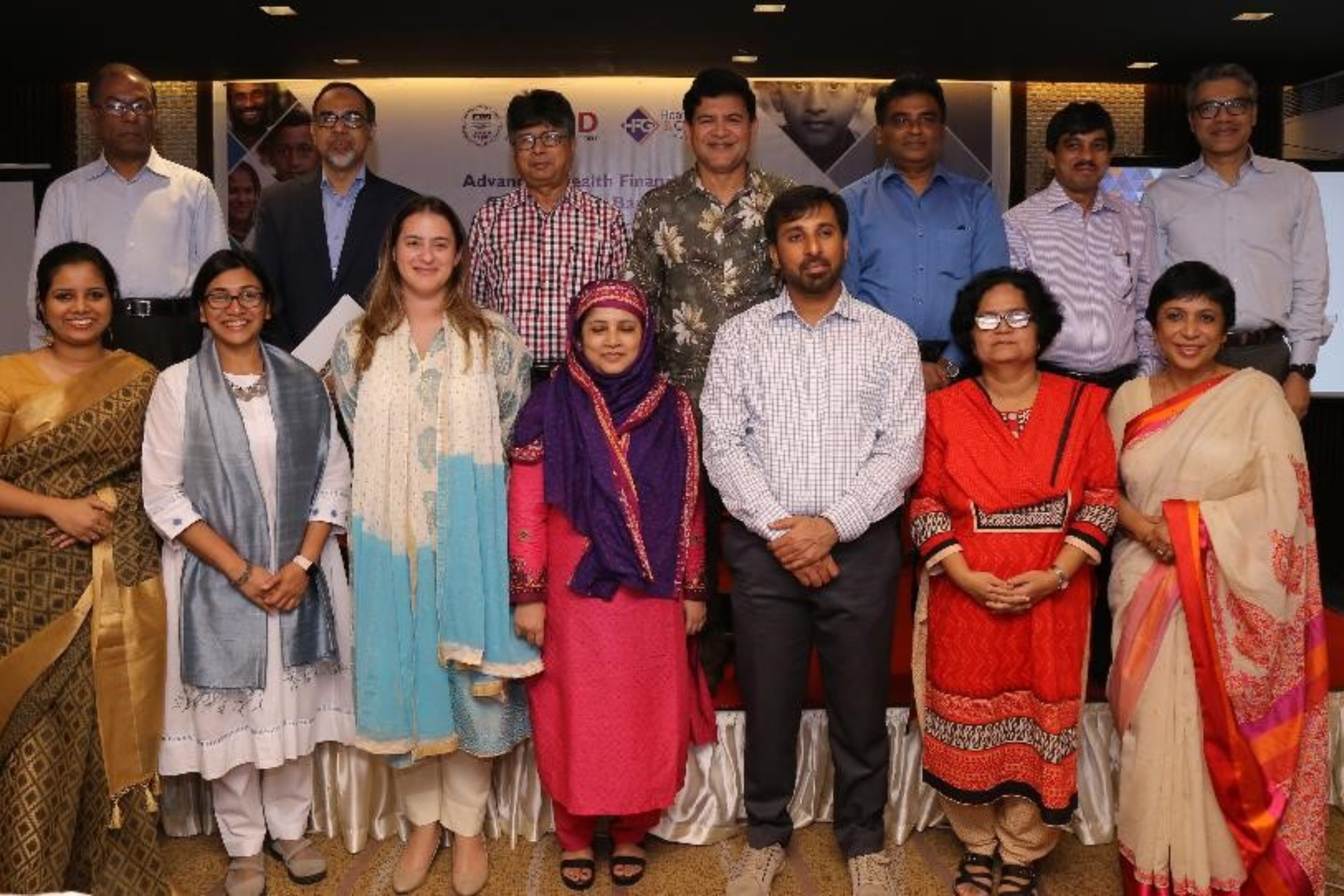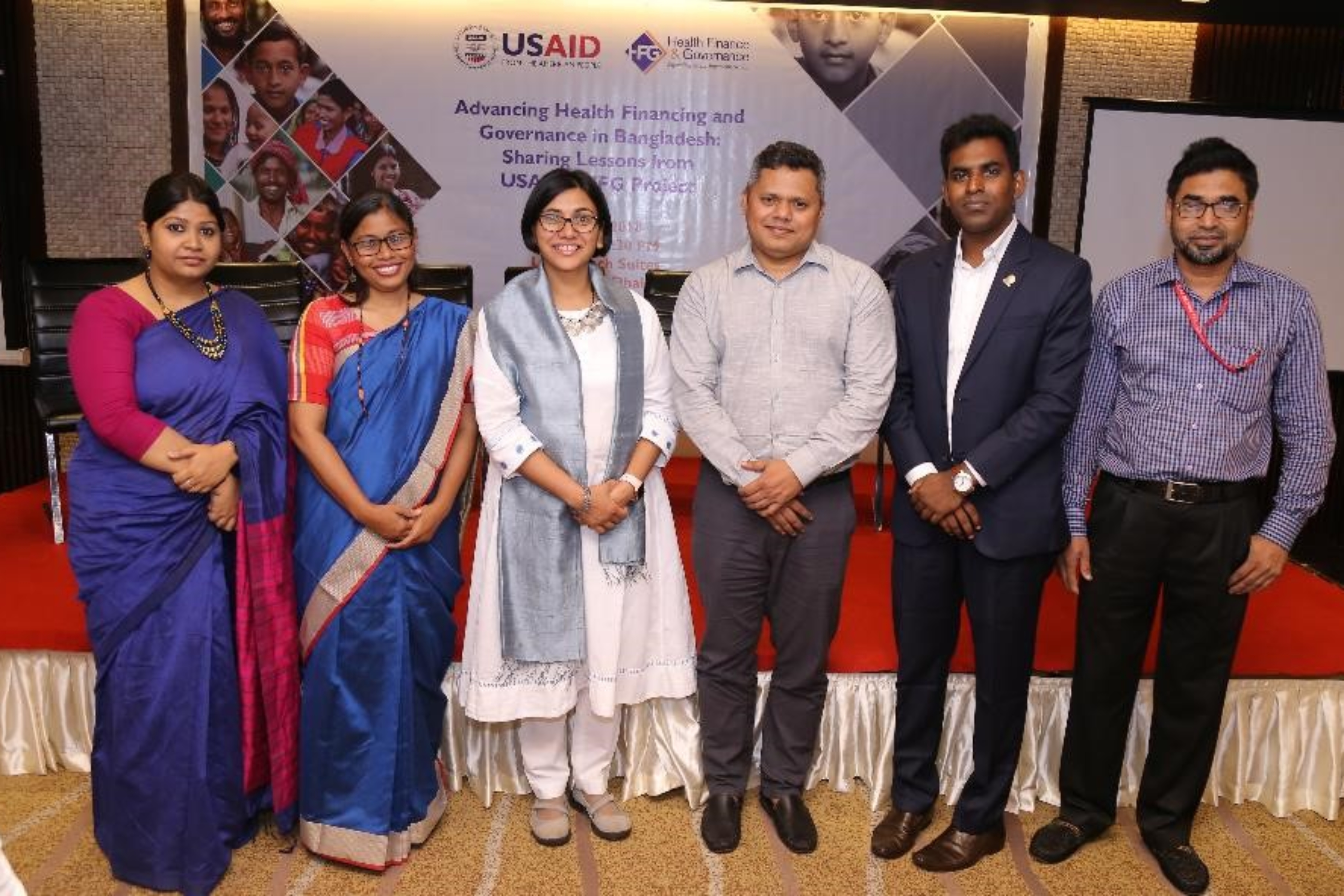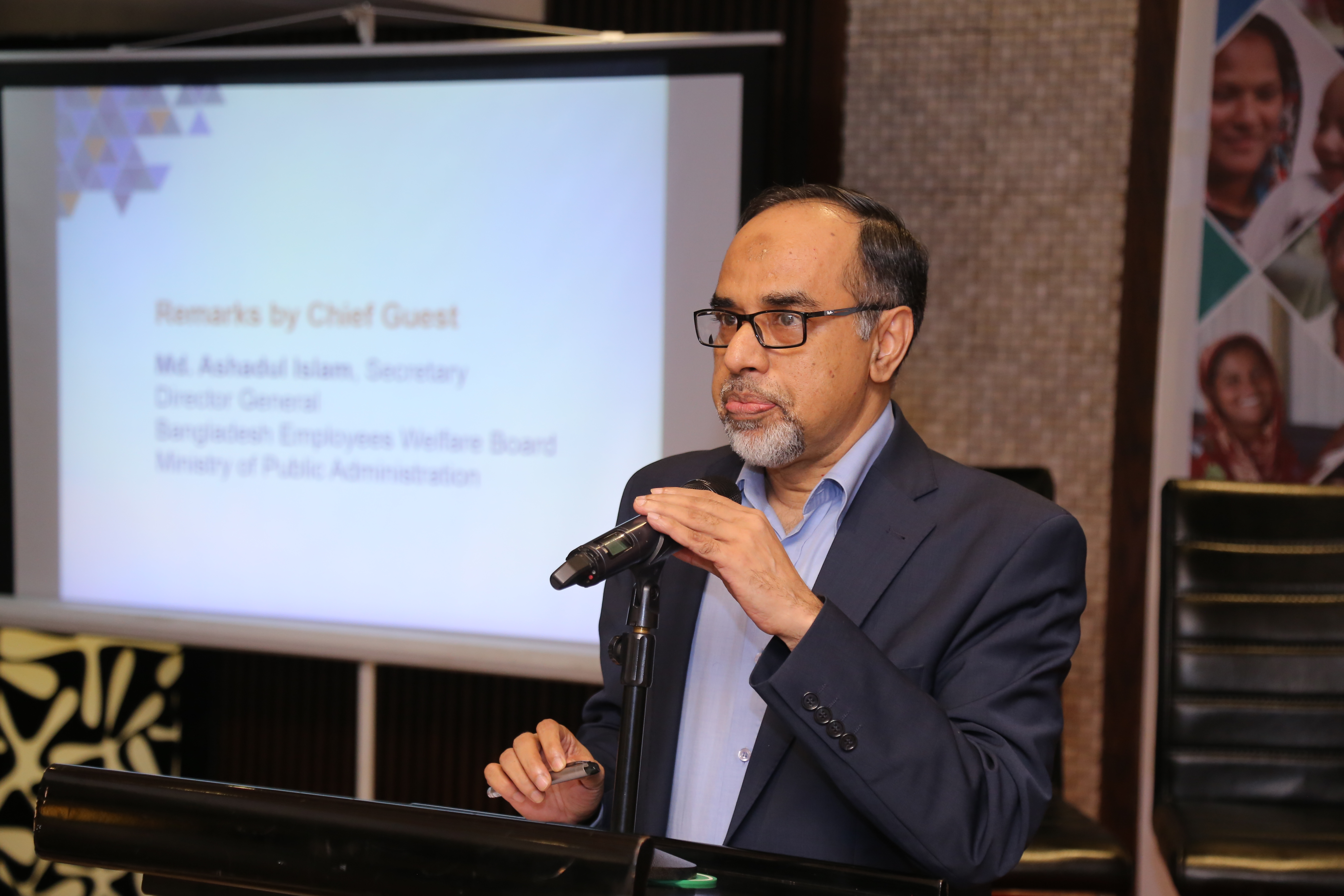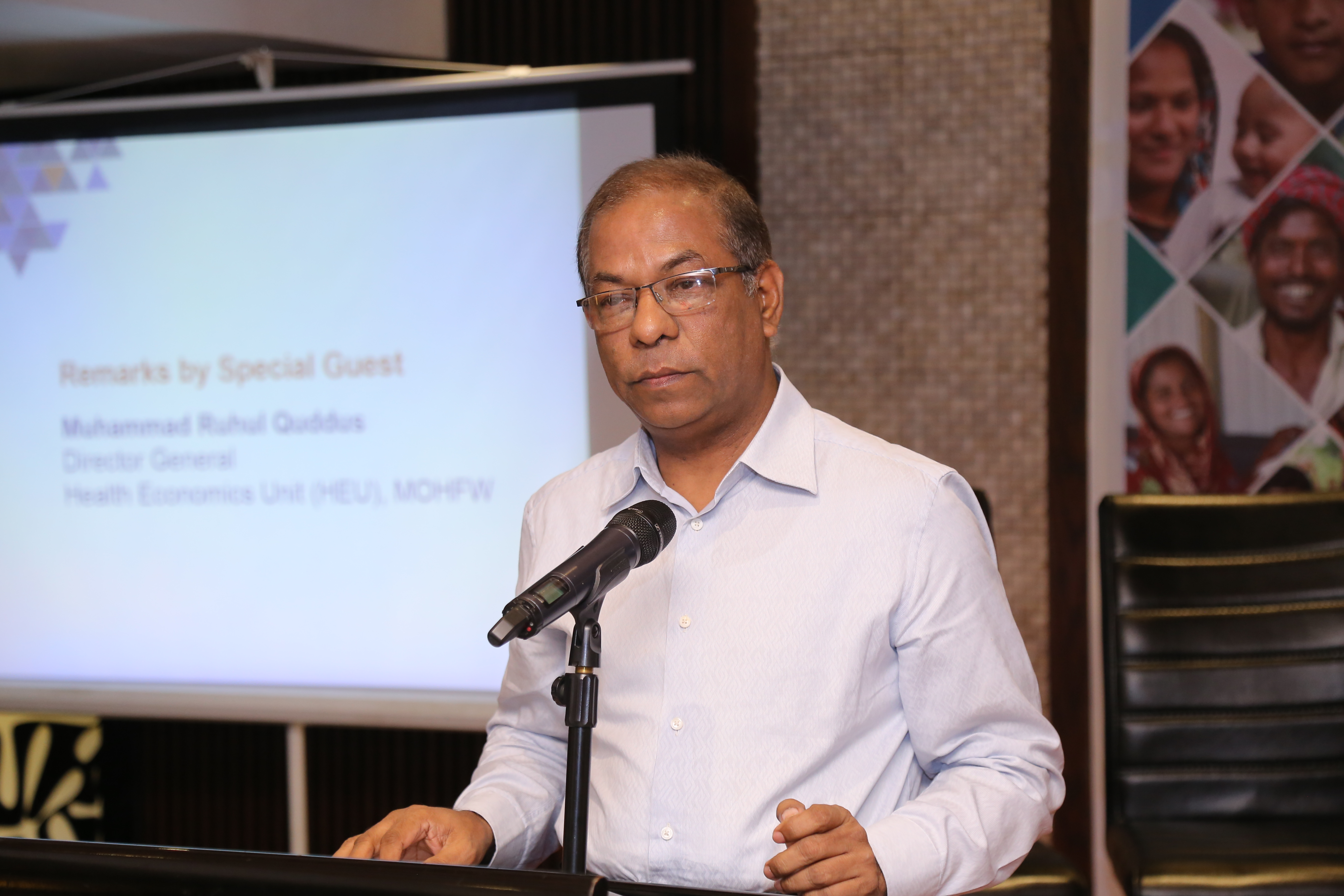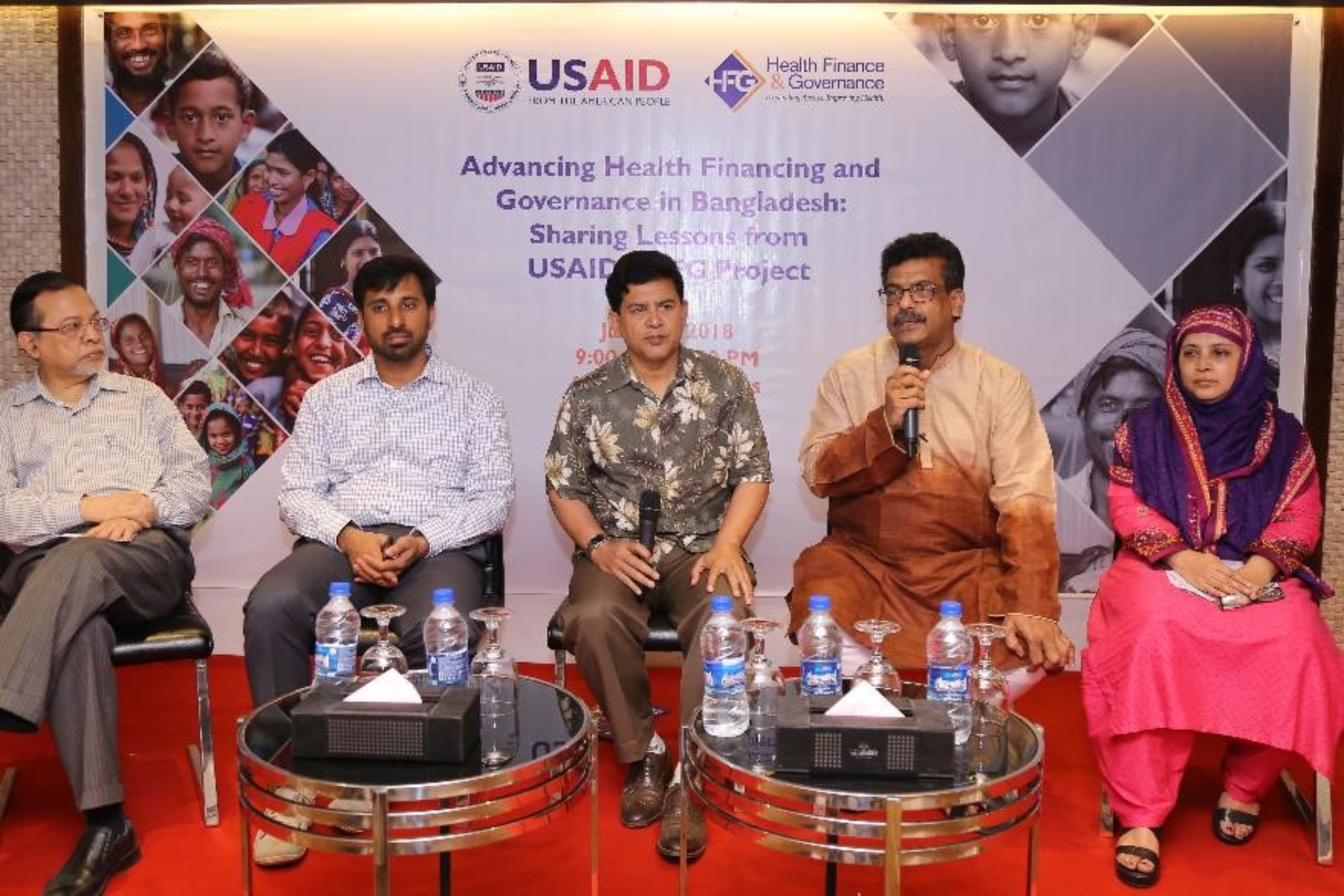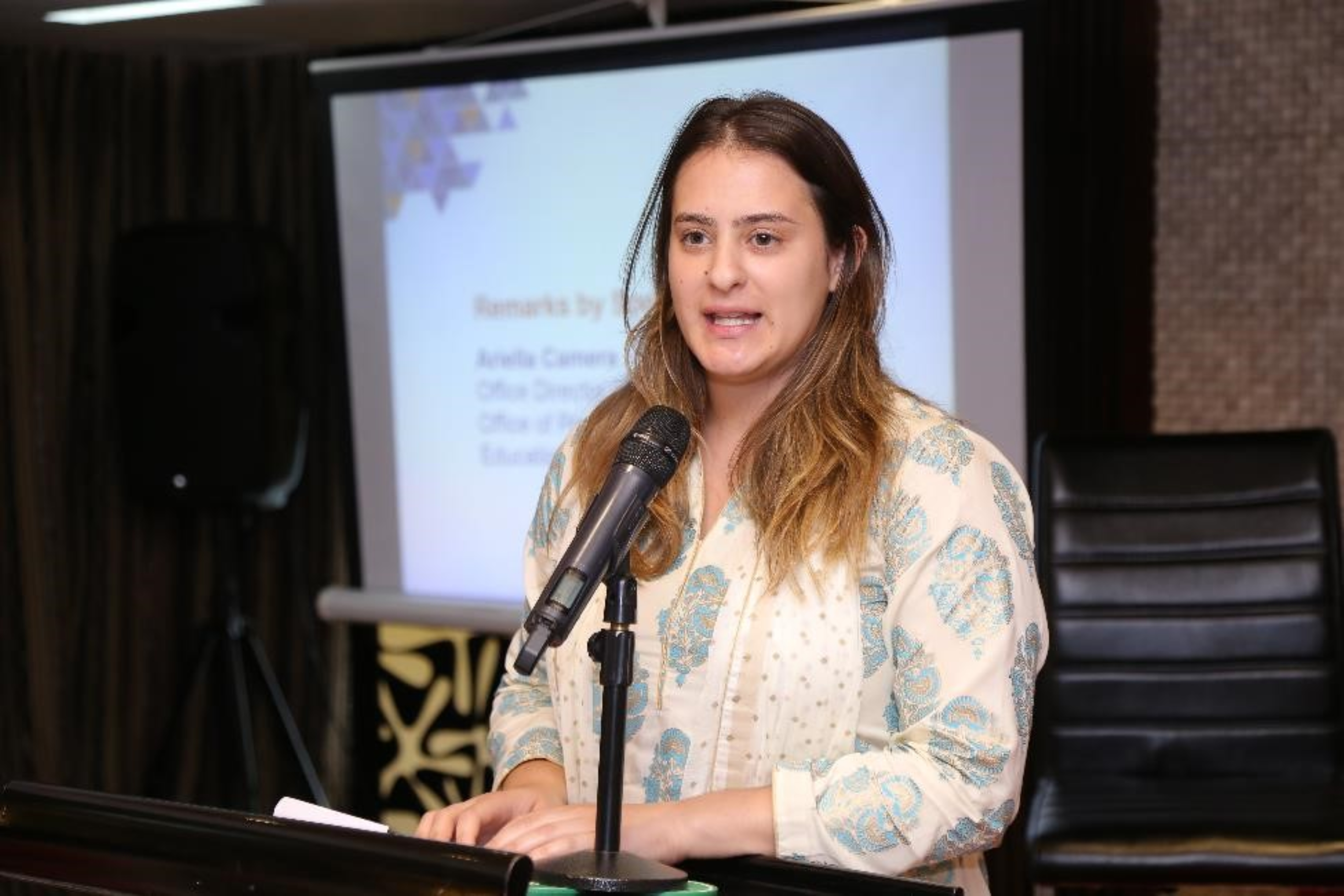HFG Bangladesh Closes
Categories: Announcements, Where We Work
June 27, 2018 – HFG Bangladesh organized it’s end of project event on June 25, 2018 titled ‘Advancing Health Financing and Governance in Bangladesh: Sharing Lessons from USAID’s HFG Project’. The event included a wide range of stakeholders, partners, and collaborators including high officials of Government of Bangladesh, USAID, academia, civil society, and others. The event included two-panel discussions and a speaker session, followed by remarks from special guests and chief guest.
The session started with a welcome note from Dr. Pushpita Samina, Clinical Services Lead, Office of Population, Health, Nutrition and Education, USAID who emphasized the importance of activities on health financing and governance in the context of Bangladesh’s health system. She also mentioned that HFG Bangladesh successfully completed many activities on health financing and governance, during the period of 2012-2018, primarily in collaboration with Government of Bangladesh and various relevant partners and stakeholders.
Then Dr. Mursaleena Islam, Country Manager, HFG Bangladesh, made a presentation on ‘Health Finance and Governance: A Life of Project Perspective Globally and from Bangladesh’ to showcase HFG’s achievements. Dr. Islam highlighted the HFG experience of working with a wide range of stakeholders including government officials, policymakers, managers of Operational Plans of the 4th Health, Population, and Nutrition Sector Programme (4th HPNSP), local government bodies, elected political representatives, academia, research institutions, development partners, and media.
The first panel discussion, ‘Strategic Communications for UHC: Mobilizing Local Resources for UHC Action’ included UHC champions from HFG organized district dialogues. The session was moderated by Dr. Hossain Zillur Rahman, Chairman, Power and Participation Research Centre (PPRC), a well-regarded economist. The panelists included two elected City Corporation mayors from two districts and two health professionals working closely on UHC awareness activities. Precise and powerful speeches from both mayors was prodigious and focused on the actions taken after initial UHC awareness dialogues at their districts. Noteworthy actions were school health program for adolescents and resource mobilization for hospitals through community support program. The health professionals emphasized the importance of prevention and early detection, involving local leaders in awareness building activities, and making the UHC initiatives sustainable. The moderator concluded that UHC awareness activities with local governing bodies helped to identify the policy issues that need to be addressed to meet UHC targets through a dynamic way of policy formulation.
Then an expert panel session titled ‘Future Trends in Health Financing and Governance: Perspectives on Resource Mobilization and Financial Protection for Health’ was moderated by Dr. Sukumar Sarker, Senior Technical and Policy Advisor, Office of Population, Health, Nutrition and Education, USAID. Dr. A. E. Md. Muhiuddin Osmani, Joint Chief, Planning Wing, MOHFW started with a presentation on ‘Resource Gap Analysis to Leverage Financing for Universal Health Coverage’ (prepared by HFG), which showed the existing resource gap scenario of ESP in Bangladesh based on allocated resources and estimated cost of implementation. The discussion panel included Dr. Shakil Ahmed, Senior Health Economist, The World Bank; Dr. Aminul Hasan, Deputy Director, Health Economics Unit, MOHFW; Mr. Sajid Rahman, CEO, Telenor Health; Prof. Syed A. Hamid, Professor and Director, Institute of Health Economics, University of Dhaka; and Dr. Shehlina Ahmed, Health and Population Advisor, DFID. The panel members discussed on available fiscal space for health budget in Bangladesh, experience and challenges from implementing Shasthya Suroksha Karmasuchi (SSK) – the pilot social protection scheme of Bangladesh, advantages of digitized health insurance schemes through mobile phones with Telenor Health as one example from the private sector, and challenges to introduce health insurance in Bangladesh. Dr. Shehlina Ahmed from DFID opined that before looking for additional resources, Bangladesh first need to focus on increasing the efficiency of the health system, especially for budget absorption capacity. Dr. Sukumar concluded the session with a note that Bangladesh health system needs to be strengthen to achieve UHC with better governance and stewardship.
At this stage, HFG invited representatives from three different partner organizations to comment on ‘Taking Forward the Health Finance and Governance Agenda: Power of Partnerships’. Dr. Shams El Arifeen, Chief of Party, USAID’s Research for Decision Makers (RDM) Activity highlighted that RDM is partnering with HFG on TB costing. He also talked about the continuation of HFG initiated UHC policy dialogue platform and establishing a ‘reference group’ for health economics experts in the country along with a data repository as an extension of HFG initiative. Dr. Malabika Sarker, Professor and Director of Research, James P. Grant School of Public Health (JPGSPH), BRAC University commented on how HFG partnered with JPGSPH over 2016-2017 to customize the global Flagship course on health system strengthening and universal health coverage for Bangladesh. She also mentioned about working on multi-stakeholder partnership for capacity building on UHC awareness and research towards UHC targets. Dr. Hossain Zillur Rahman, Convener, Healthy Bangladesh talked about continuing UHC awareness activities engaging a wider range of stakeholders and efforts to build a momentum to reform policies on several priority issues for targeting poor in Bangladesh context.
As Special Guest, Ms. Ariella Camera, Office Director (Acting), Office of Population, Health, Nutrition and Education, USAID, thanked all the participants, presenters and discussants of the program. Ms. Camera reminded the audience regarding the HFG’s role in supporting the Government of Bangladesh towards achieving UHC. Ms. Camera appreciated HFG activities on increasing awareness on UHC among wide range of stakeholders and policymakers, costing health services in public and NGO sector, resource gap analysis for ESP, and review on targeting approaches. She stated the future role of USAID by saying, “the work of the HFG project will be carried forward through USAID and its partners, ensuring continuity and sustainability”.
Mr. Muhammad Ruhul Quddus, Director General, Health Economics Unit, MOHFW, also spoke as a Special Guest, and appreciated the supportive role of HFG towards generating evidences for policymakers of health sector. He highlighted HFG’s work on organizational assessment of Health Economics Unit and proposed repositioning plan with suggested new name as ‘Directorate General of Health Economics and Policy (DGHEP)’. DG HEU expressed his willingness to process this repositioning plan for a stronger Health Economics Unit.
As concluding remarks, the Chief Guest of the event, Mr. Md. Ashadul Islam, Secretary, Government of Bangladesh, and Director General, Bangladesh Employee’s Welfare Board, Ministry of Public Administration, thanked HFG project for their activities on health financing and governance in Bangladesh and for creating such a multi-sectoral forum on UHC awareness. Mr. Islam expressed his expectations for continuing work on governance issues for all six building blocks of health system as well as prioritization of UHC related interventions, in order to achieve UHC in Bangladesh.




